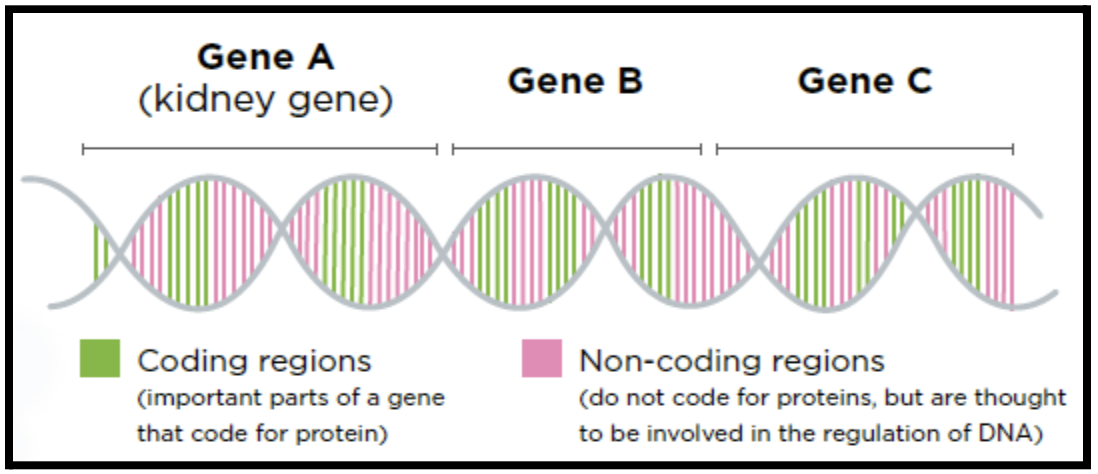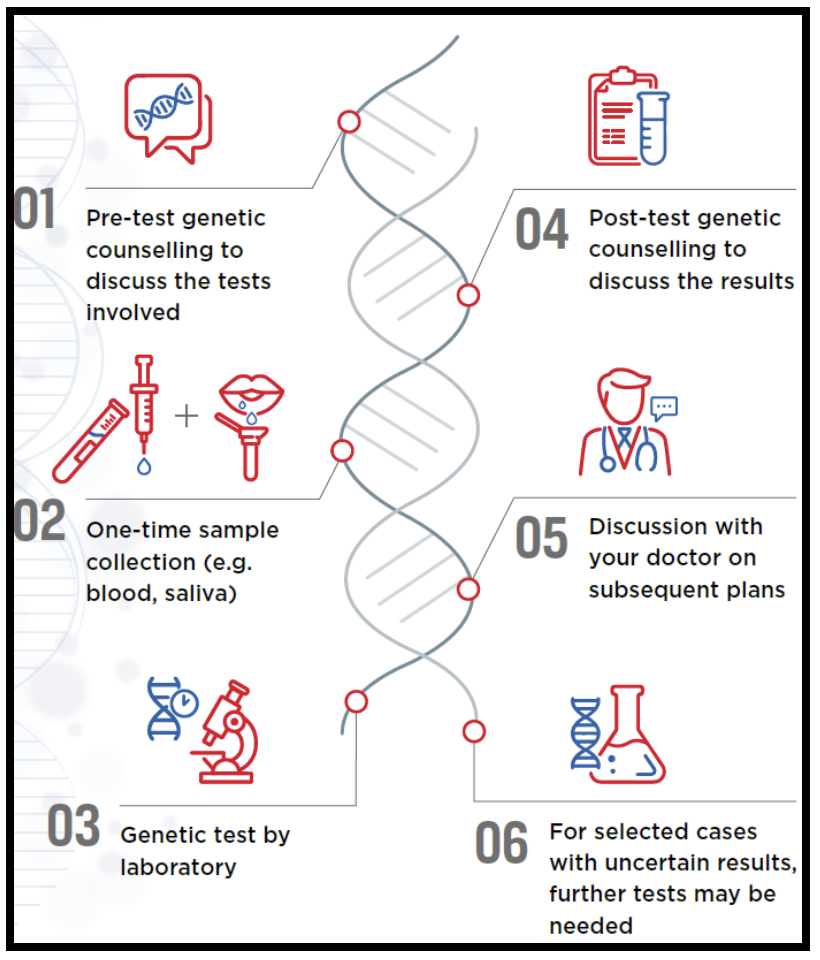What is genetic testing?
Genes are made up of DNA. They contain instructions for our body functions. Genetic testing is an evaluation of your genes and it can identify DNA changes that may cause kidney diseases.
Understanding genes
Genes are lined up on the DNA strands. Each gene is made up of several coding regions and non-coding regions.

The coding regions are the most important parts of a gene because they contain instructions for the cells to make proteins. A change in the coding region may alter the structure of the protein made by the cells. This in turn can affect the cell function and cause disease.
The non-coding regions of genes are thought to be less important than the coding regions because they do not contain direct instructions for the cells to make proteins. However, certain parts of the non-coding regions may still affect cell function through other ways like signaling or regulatory pathways.
How can genetic testing be useful?
Genetic testing may help to:
- Diagnose the cause of your kidney condition
- Find the most suitable treatment for the kidney disease
- Predict the likelihood of progression in the kidney disease
- Allow targeted screening of other affected organs like the eye or ear.
- Predict the risk of similar kidney diseases in family members and future offsprings
- Select the most suitable kidney donor (if a kidney transplant is required)
What does genetic testing involve?

Step 1: Pre-test genetic counselling
A consultation with a doctor or genetic counsellor to understand more about genetic testing. There will be a chance to ask questions, learn more about the process and decide whether you wish to go ahead with testing.
If you agree to do genetic testing, your signed consent will be required. You have the right to decline genetic testing, or withdraw your consent if the genetic test has not been performed yet.
Step 2: Sample collection
Most people will need only a single sample collection (this can be blood, saliva or swab on your inner cheek). Blood is preferred generally because more DNA can be obtained.
Very rarely, a second sample collection may be required for further testing or if there are technical errors.
Step 3: Genetic testing in the laboratory
The sample will be sent to an accredited laboratory for the genetic test. Your DNA (genetic material) will be extracted from the sample, and selected parts of the DNA will be checked carefully.
In a normal person, thousands of DNA or gene changes are usually identified. Almost all of these DNA changes are benign and do not cause disease. Often only 1 or 2 DNA changes can be disease-causing (pathogenic or likely pathogenic).
After the actual sequencing of the DNA, detailed data analysis by a team of scientists, doctors and experts will be performed. This is often the most tedious part. They will use sophisticated computing software, published scientific literature and databases, as well as your medical and/or family details to determine which of the DNA changes may be disease-causing. These findings will then be put into a genetic report which will be returned to your doctor. This report is typically returned to the hospital in 6 weeks.
Your genetic findings will be discussed in a deidentified way with other genetic experts in Singapore in a regular monthly board meeting. This multidisciplinary discussion is important to ensure that the genetic report is consistent with your clinical findings, and hence is accurate. It allows for any discrepancies and ambiguities to be discussed.
Step 4: Post-test genetic counselling
A second consultation will then be arranged for you to meet with the doctor or the genetic counsellor to discuss the genetic test result and what it means.
Your genetic test result will be put in your electronic medical records and your doctors can use these results to provide a better treatment for you.
Step 5: Changes to your treatment plans based on the genetic result
Your doctors will discuss with you how your treatment plans can be changed based on the genetic results. The new plans may include:
- Medicines which are less suitable may be stopped, decreased or avoided. Medicines that is more suitable may be started or increased.
- A kidney biopsy may be needed or may no longer be needed to diagnose the kidney condition.
- Arrange for screening tests to look for medical conditions that may be associated with the genetic condition (e.g. hearing test, eye check).
- Your family members may be invited for genetic testing, in order to determine if they are at risk of developing the same kidney condition.
- Determine which family member can be the most suitable kidney donor (if you require a kidney transplant).
Step 6: Further tests (for selected cases with uncertain genetic test results)
Sometimes, experts find insufficient scientific data to determine if a particular DNA change is the cause of the kidney disease. In such situation, further tests may be helpful.
What are the methods of genetic testing?
There are many kinds of genetic tests and prices can vary greatly. Here is a brief description of the three main basic types:
- Targeted gene panel sequencing
This test involves a detailed evaluation of the coding regions only in genes known to cause kidney diseases.

- Whole exome sequencing
This involves a detailed evaluation of the coding regions in all 22,000 genes in humans.

- Whole genome sequencing
This is a detailed evaluation of both coding and non-coding regions in all 22,000 genes in humans.

A consultation with the geneticist will be required if you choose to do “whole exome sequencing” or “whole genome sequencing”.
What are the possible results of your genetic test?
Positive result: A disease-causing gene variant has been found
This means the gene variant(s) which can explain the kidney disease have been identified. Different genetic variants may have different treatment options and outcomes; and may affect other organs in the body. The doctor will explain more in detail and how this result can impact on subsequent treatment plans.
Possible impact of a positive genetic test result can include the following:
- Adjust the treatment of the kidney disease
The genetic result can help the doctor determine the most appropriate treatment plan. This may include adjustment of medicines that suppress the immune system or initiation of specialized treatment.
- Select the most suitable kidney donor
If there is eventual kidney failure and a living-related kidney transplant is being planned, the genetic test result can help doctors to select the most suitable donor.
- Determine the risk of the genetic disease in family members
Family members can choose to undergo the genetic test to check if they carry the same DNA change. However, a person who carries a DNA change (deemed to be disease-causing) may not always develop that kidney disease in the future.
- Determine the risk of the genetic disease in future children.
The likelihood of future offspring inheriting the same DNA change and developing the disease can be predicted, and this may help one make reproductive decisions.
- Make lifestyle changes.
If you are at risk of genetic kidney disease, lifestyle changes may reduce the severity of kidney diseases in the future, especially if these are instituted early. These can include the following:
- Maintain a healthy weight. Being overweight will add extra burden to the kidneys.
- Have a healthy diet with no excessive salt, refined sugars or calories to prevent diabetes and high blood pressure.
- Exercise for at least 30 minutes, 3 times a week.
- Avoid smoking.
- Make other life decisions
The genetic test result may help you make decisions on your career and insurance. You may request further information from your doctor or genetic counsellor.
- Connect with peer support network
You may participate in research, registries or peer support groups related to the genetic condition. These options may help you stay updated with new developments in prevention or treatment, and help you find support to cope with your diagnosis.
Negative result No disease-causing gene variant has been found.
A negative result does not guarantee that you do not have a genetic condition.
In other words, false negative results can occur. This usually happens if
- The culprit gene is not included in the genetic test.
- The culprit DNA change cannot be detected in the genetic test performed.
- The analysis of the genetic data is wrong. The main limitation in the analysis of genetic data is the insufficient scientific knowledge. In other words, what we currently think is a benign DNA change may actually be a disease-causing change, but wrongly classified based on current scientific knowledge.
More advanced genetic tests may be considered to include more genes, or to use more sophisticated methods to detect complex DNA changes. Alternatively, re-analysis of the genetic data may be performed in the future when there may be more scientific knowledge.
With a negative genetic result, your doctors may still use this result to adjust your treatment plan and medications. For example, the medicines to suppress immune system may be increased.
Uncertain result: A DNA change of uncertain significance (VUS) is detected
There is currently not enough knowledge to interpret the exact meaning of your result and if it can cause kidney disease.
Examples of subsequent tests that may be helpful
- Look for more clinical evidence to determine if you have a genetic disease. This can include a kidney biopsy, additional clinical tests like blood tests, hearing tests or eye checks.
- Genetic tests on family members. Genetic testing on your family members to determine if they carry the same DNA change, as well as further clinical tests (eg urine tests) on your family members may be helpful to provide further clues on whether the uncertain DNA change is disease-causing. The aim of such tests is to determine the presence or absence of the DNA change on the affected or healthy family members.
- Additional blood test: RNA sequencing for genetic variants involving splice sites. This is a different kind of genetic test and is useful only for specific kinds of DNA changes. A second blood sample will be required for this.
- Research tests may involve:
- Excess kidney biopsy samples. If you have stored excess kidney biopsy samples, research tests may be performed on these samples. Such tests include RNA sequencing, or immunostaining.
- Urine sample: Genetic testing on urine cells may be performed in selected cases to determine if there may be additional DNA changes in the kidney that cannot be found on the blood sample.
Note: You will have to sign a research consent form if you decide to proceed with the research tests.
Re-analysis of the genetic data may be performed in the future when there may be more scientific knowledge.


